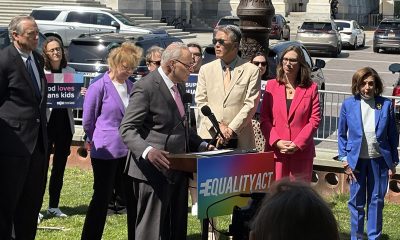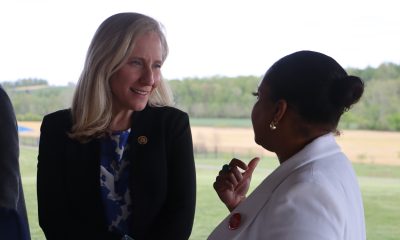News
Ros-Lehtinen becomes latest GOP co-sponsor of Equality Act
Republican supports LGBT measures after last year expressing ‘concerns’
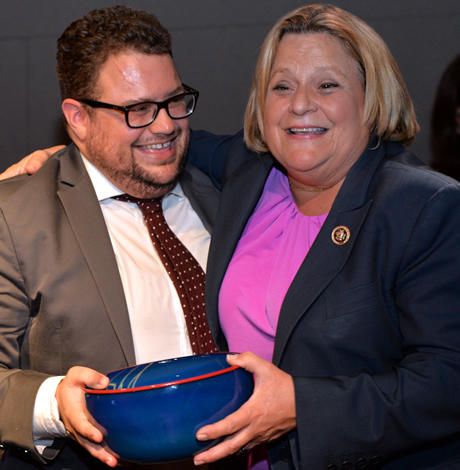
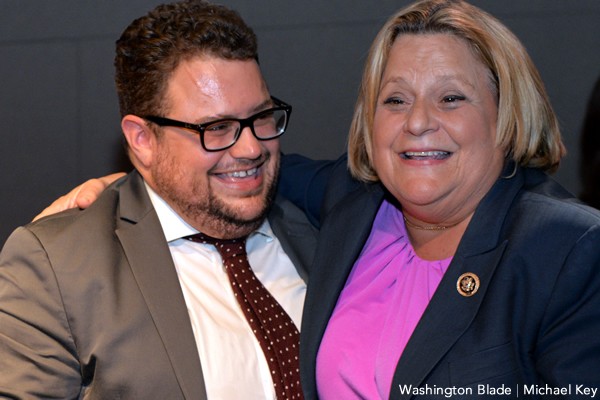
Rodrigo Heng-Lehtinen and his mother, Rep. Ileana Ros-Lehtinen (R-Fla.) attend the National Center for Transgender Equality’s 13th anniversary at Hamilton Live on May 18, 2016. (Washington Blade file photo by Michael Key)
A Republican member of the U.S. House who supports LGBT rights — but had concerns about the Equality Act — has now become a co-sponsor of the legislation.
Rep. Ileana Ros-Lehtinen (R-Fla.) — who has a transgender son, Rodrigo — quietly became on Friday the second House Republican and third Republican in Congress to co-sponsor the comprehensive LGBT rights legislation.
The legislation, introduced by Rep. David Cicilline (D-R.I.) in the House and Sen. Jeff Merkley (D-Ore.) in the Senate, would add sexual orientation and gender identity to the Civil Rights Act of 1964 to prohibit discrimination against LGBT people in employment, housing, jury service, federal programs, credit, education and public accommodations. The legislation now has 177 co-sponsors in the House and 41 co-sponsors in the Senate.
Jay Brown, a spokesperson for the Human Rights Campaign, said in a statement Ros-Lehtinen’s co-sponsorship of the Equality Act demonstrates the bipartisan appeal of the legislation.
“Equality isn’t a partisan value,” Brown said. “It’s an American value. Rep. Ros-Lehtinen is once again stepping up to ensure LGBTQ people have the same access and opportunities as our neighbors.”
Still, Republican support for the legislation is very limited. The only other Republican co-sponsor of the Equality Act in the House is Rep. Robert Dold (R-Ill.). In the Senate, Mark Kirk (R-Ill.) remains the only Republican co-sponsor of the legislation.
Ros-Lehtinen’s co-sponsorship of the Equality Act marks a departure from the “concerns” she expressed about the legislation even she’s considered the most pro-LGBT Republican in Congress. At the time of the bill’s introduction, Ros-Lehtinen cited “concerns about the current proposal’s broadness and how it will impact religious organizations.”
The Washington Blade has placed a request in with Ros-Lehtinen’s office seeking comment on why she would co-sponsor the Equality Act now after expressing concerns about the legislation last year.
District of Columbia
Dr. Fauci receives Harvey Milk Award, reflects on legacy of love and public health
The legendary public health leader was honored by a D.C. LGBTQ synagogue for his lifetime of compassionate service and advocacy.
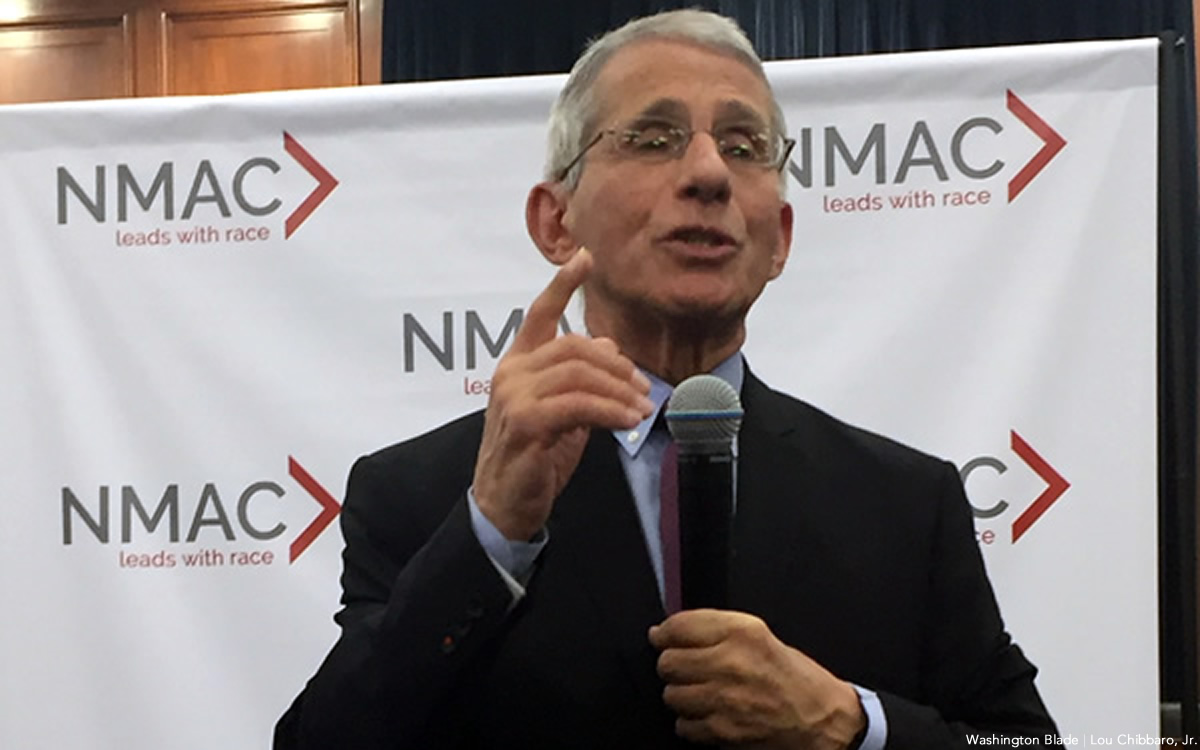
A buzz of anticipation filled Cafritz Hall on Wednesday evening. Though a few seats remained empty, the atmosphere suggested a pop star might be moments from taking the stage. But the spotlight wasn’t reserved for a chart-topping performer—it was focused on a different kind of icon.
Dr. Anthony Fauci, the former director of the National Institute of Allergy and Infectious Diseases (NIAID), stepped forward to receive the Harvey Milk Chesed Award—an honor recognizing compassion, courage, and a lifetime of public service.
The Harvey Milk Chesed Award was established by Bet Mishpachah in 1998 in honor of civil rights leader Harvey Milk. Milk, a member of the San Francisco Board of Supervisors and one of the first openly gay elected officials in the United States, was assassinated in 1978 following his public advocacy for LGBTQ rights. Bet Mishpachah gives out the award annually to an individual who has made “outstanding contributions to the LGBTQ+ and Jewish communities that exemplify the virtue of chesed, or ‘lovingkindness.’”
The program began promptly at 7 p.m. at Bet Mishpachah, Washington’s LGBTQ egalitarian synagogue, and featured a diverse lineup of speakers, including rabbis, physicians, professors, synagogue members, and past recipients of the Harvey Milk Chesed Award. While each speaker highlighted different facets of Dr. Fauci’s career – from his leadership during public health crises to his engagement with Jewish and LGBTQ communities- a unifying theme emerged: his unwavering commitment to doing what’s right, even in the face of political opposition, including from presidents.
Fauci, who was director of the NIAID from 1984 to 2022, was at the forefront of understanding and combating some of the deadliest diseases known to humanity, including tuberculosis, Zika, and HIV/AIDS. As the HIV/AIDS epidemic escalated and frustration with federal inaction mounted, Fauci took an unconventional step for a high-ranking public health official: He began engaging directly with the activists demanding change. That simple act of listening, he later explained, shaped his understanding of what patients truly needed — even when it meant defying the prevailing wisdom of the medical establishment.
“I developed long-term friendships with the activists,” Fauci said in a 2023 interview with PBS’ American Masters. “We were sort of like soldiers in the same war.”
This spirit of solidarity echoed throughout the night’s speakers, beginning with Barry Friedman, who delivered welcoming remarks to the crowd. Friedman began his introduction with a Hebrew phrase that, at first glance, might not seem to align with a man devoted to the rigor of medical science. But as he explained, it was a phrase Fauci exemplified.
“Lo tukhal l’hitaleim,” Friedman read from his notes, explaining that this message was hailed in his youth as the “11th commandment” by his mother. “You must not remain indifferent,” he translated.
Fauci, Friedman explained, remained steadfast in the principles of medicine while also showing deep compassion for those living with HIV and AIDS. He advocated for changes to drug trial protocols—convincing researchers to allow patients to “parallel track” experimental treatments, even when doing so went against past medical norms. This shift helped extend lives and alleviate symptoms in those most affected by the disease.
As the night continued, speaker after speaker reflected on the extraordinary achievements Fauci helped bring about—not just through scientific breakthroughs, but by listening to the people who were so often ignored. Fauci credited activists like Larry Kramer for ensuring the needs of HIV/AIDS patients could not be overlooked.
One of those speakers, Jeff Levi, an emeritus professor at the Milken Institute School of Public Health at George Washington University, former deputy director of the White House Office of National AIDS Policy, and a close friend of Fauci, led a panel discussion where the two expanded on stories from Fauci’s 2024 bestselling book “On Call: A Doctor’s Journey in Public Service.” During the panel, Fauci reflected on how his Jesuit Catholic upbringing helped shape a moral compass that transcended religious, cultural, and political boundaries in his public health work, and how he was able to navigate such a difficult time in medical history.
While it’s nearly impossible to calculate how many lives Fauci has helped save, the numbers point to an extraordinary legacy. Millions of LGBTQ people owe their survival in part to his efforts to understand how HIV spread, how it progressed, and how its symptoms could be mitigated. In addition, more than 25 million people worldwide- mostly in sub-Saharan Africa- have benefited from PEPFAR, the President’s Emergency Plan for AIDS Relief, which Fauci played a key role in creating.
Following the panel, Fauci took questions from the audience, reflecting on both his legacy and the enduring power of public advocacy.
“The gay community wasn’t afraid to speak up in the 1980s,” he told one audience member, who asked about the parallels between HIV/AIDS and the COVID-19 pandemic, and what people could do now to offset some of the… less than factual ‘information’ being presented as truth from the Trump administration. “And we can’t be afraid to speak up now.”
When asked what message he hopes young LGBTQ doctors will take from his life’s work, Fauci paused, then offered a heartfelt answer. “I don’t want to sound too melodramatic, but we need to love each other.”
As the crowd filtered out of the hall and only a handful of Fauci admirers lingered in line for a signed book, the Blade caught up with the evening’s honoree. Asked how it felt to receive the Harvey Milk Chesed Award, Fauci’s response was characteristically humble.
“It was a terrific honor to be given an award by this community,” he said with a warm smile—an understated close to an evening that celebrated a lifetime of extraordinary impact.
Local
Comings & Goings
SC Nealy joins Equality Arlington board; Lee Ann Wilkinson Group scores another #1 ranking
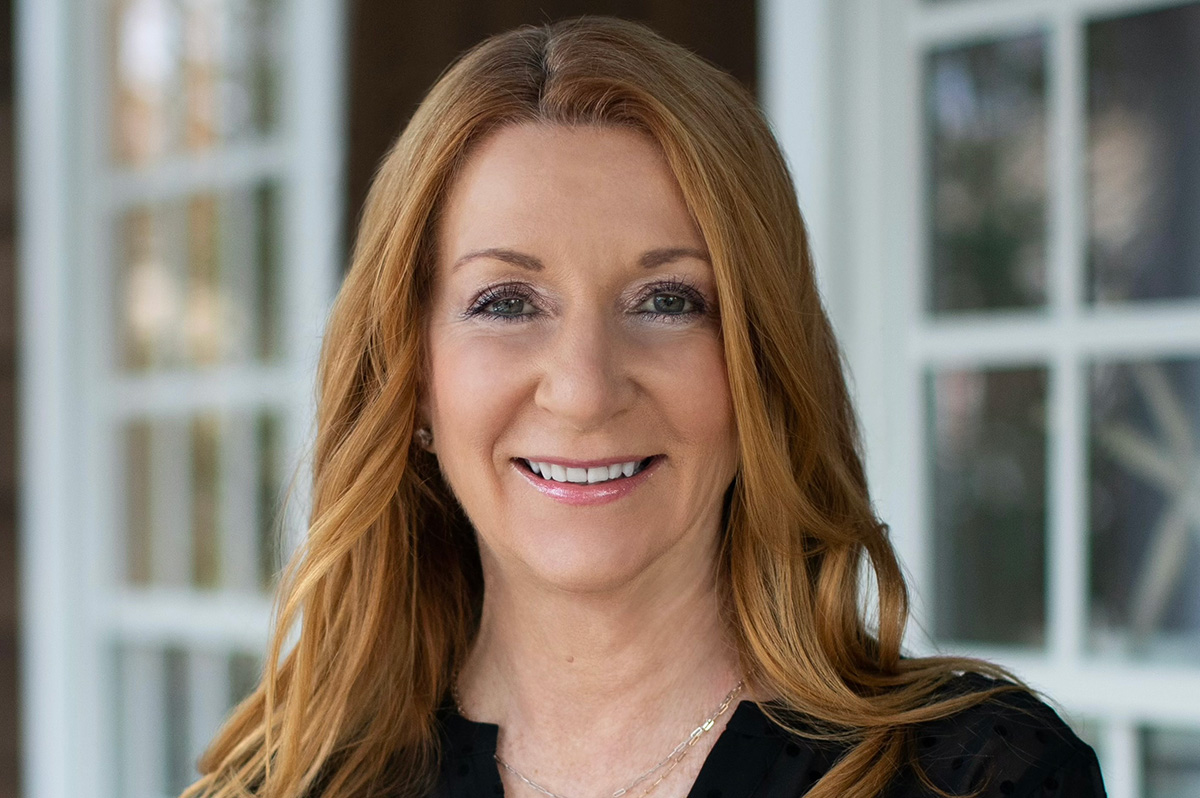
The Comings & Goings column is about sharing the professional successes of our community. We want to recognize those landing new jobs, new clients for their business, joining boards of organizations and other achievements. Please share your successes with us at [email protected].
The Comings & Goings column also invites LGBTQ college students to share their successes with us. If you have been elected to a student government position, gotten an exciting internship, or are graduating and beginning your career with a great job, let us know so we can share your success.
Congratulations to The Lee Ann Wilkinson Group, which retained its #1 ranking in sales production at Berkshire Hathaway HomeServices Worldwide, for the second consecutive year.
“Last year when we achieved #1, I was truly shocked,” said Lee Ann Wilkinson. “I never thought our little piece of paradise here in southern Delaware could compete with the larger states and more expensive markets. Achieving this level of recognition on an international scale for a second year is surreal. I couldn’t be prouder of my dedicated team, whose hard work and commitment to exceptional service make achievements like this possible. We are fortunate to do what we love, and to see our efforts recognized at this level is an honor. It’s amazing to reflect on four decades of serving our clients, whose loyalty and support have made this journey so special.”
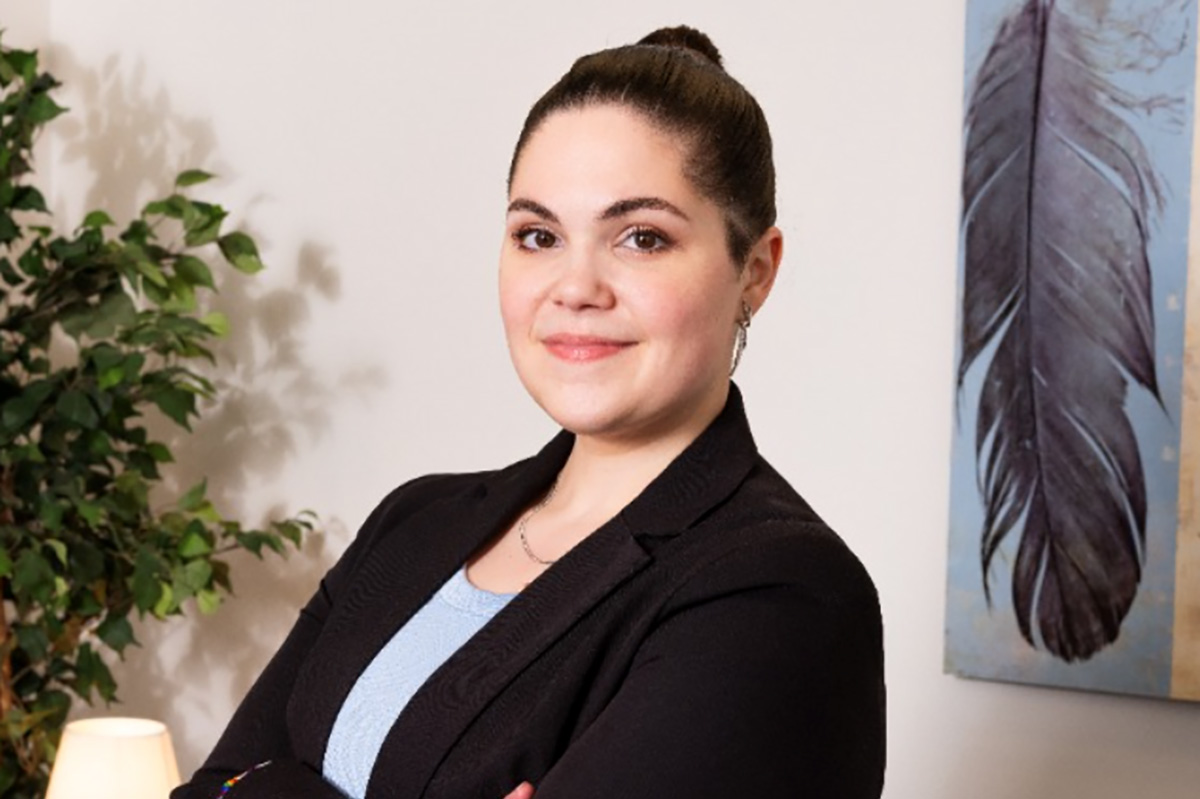
Congratulations also to SC Nealy, LPC, on becoming a new board member of Equality Arlington. Nealy said, “I have always been passionate about creating more accessible and queer celebratory mental health care for the LGBTQIA2S+ community in the DMV area, and I’m excited to work with Equality Arlington to keep working toward that goal and many others for our community here.”
Nealy has more than 15 years in the mental health field. They are a queer, gender fluid psychotherapist, clinical supervisor, and group practice owner in Arlington, Va. Nealy operates a team of all gay and trans-identifying therapists with the focus of bringing clinicians with lived experiences to the queer community and their families. They also work locally and nationally to advocate for queer rights, accessible mental health care, and bringing more awareness to the needs of the queer community. Their upcoming book published by Bloomsbury Academics, “Healing Sacred Wounds,” focuses on providing a guide map for processing and exploring their experiences in religious or spiritual trauma. As a therapist, Nealy specializes in religious trauma, female and genderfluid-identifying couples counseling, mixed orientation marriages, complex-PTSD, Borderline Personality Disorder, interpersonal process group therapy, and non-faith based premarital counseling. In their personal life, they are a parent to two children, happily partnered, and write romance novels for fun. Nealy received the 2024 Humanitarian and Caring Person of the Year Award, Virginia Counselors Association.
Nealy earned a bachelor’s degree with honors in psychology from Marymount University, a master’s in clinical and mental health counseling from Marymount; and a master’s in forensic psychology, also from Marymount.
District of Columbia
Mayor joins ribbon-cutting for opening of D.C. LGBTQ seniors home
Mary’s House for Older Adults operates facility for 15 senior
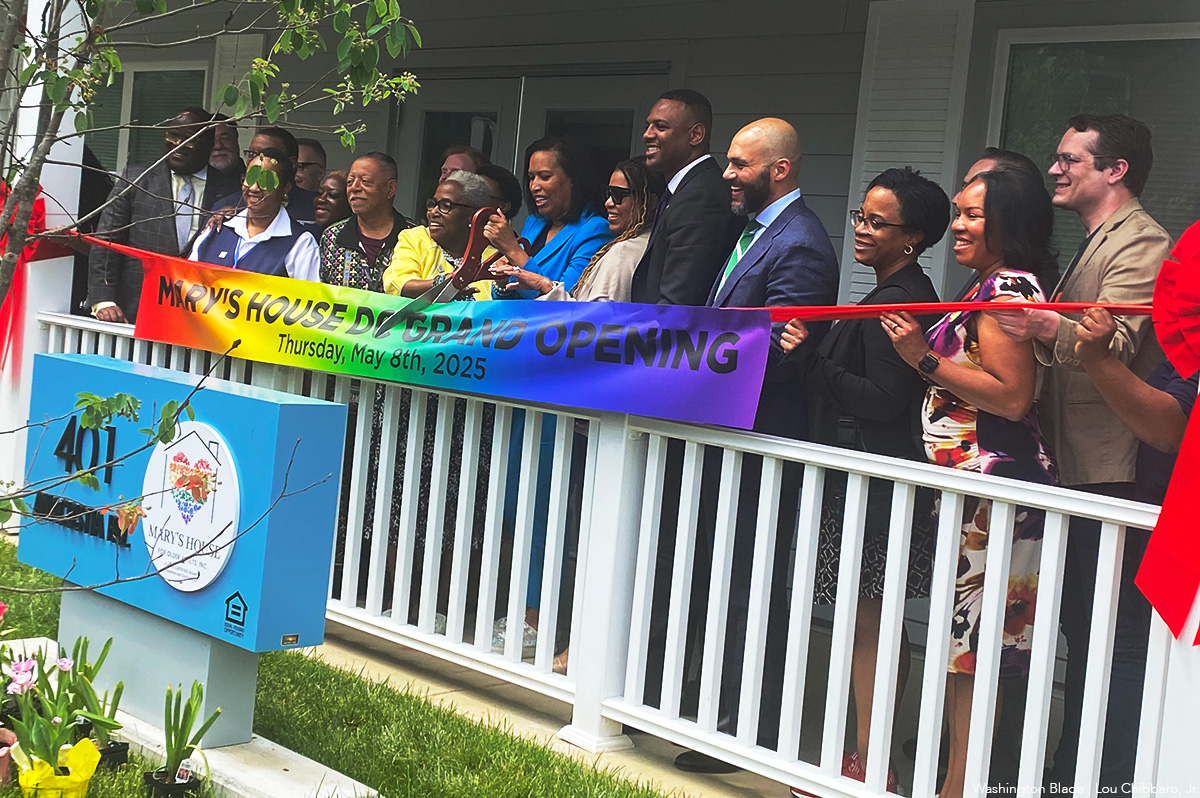
Close to 100 people joined D.C. Mayor Muriel Bowser, two members of the D.C. Council, and other city officials for a ribbon-cutting ceremony marking the official opening of Mary’s House for Older Adults, the city’s first home dedicated to LGBTQ seniors.
Located at 401 Anacostia Rd., S.E. in the city’s Fort Dupont neighborhood, the three-story house includes 15 single-occupancy residential units and more than 5,000 square feet of communal living space.
Imani Woody, the Mary’s House President, CEO, and founder, said construction of the new house, which is located on the site of the house she grew up in, was completed in January and residents began moving in in March. She said there is now a waiting list for those interested in living there.
Bowser and Woody were among nine city officials and community leaders who spoke at the event in a large outdoor courtyard behind the house that’s part of Mary’s House grounds.
“You are providing housing,” Bowser told Woody in her remarks at the event. “You are providing a solution to the epidemic of loneliness. You are providing a vehicle for Washingtonians to stay in Washington,” the mayor said. “And you are showing that a woman with an idea who cannot be stopped can deliver for D.C.”
Bowser called Mary’s House a model for senior housing that she said could be brought to other parts of the city.
Woody thanked the mayor and the D.C. Council for providing city funding to support Mary’s House.
“This house is amazing,” she told the gathering. “It houses 15 people. But the concept is more than 15 people,” she said. “This is a place for residents of Washington, D.C., LGBTQ+ same-gender-loving to have a safe space.”
Among the others participating in the event were Japer Bowles, director of the Mayor’s Office of LGBTQ Affairs, and D.C. Council members Robert White (D-At-Large) and Wendell Felder (D-Ward 7).
Felder, who noted that Mary’s House is located in Ward 7, which he represents, called the ward a “welcoming community” that absolutely has welcomed Mary’s House.
“Mary’s House represents more than just bricks and mortar,” he told the gathering. “It’s a testament to what we can achieve when we commit to justice, inclusion and community. It recognizes that our elders, especially those in the LGBTQ+ and same-gender-loving communities, in a diverse space that honors their full identity and provides not only shelter but affirmation and belonging.”
Woody said each of the 15 individual units or suites at Mary’s House includes a sleeping area, living room, bathroom, and kitchenette with a sink, microwave and refrigerator but no stove. The Mary’s House website says the shared communal areas of the house include a “fully equipped kitchen, separate dining area and living room.”
It says the communal area also includes a computer room, arts and crafts room, an exercise room, laundry facilities, community meeting space, a “tranquil quiet room for relaxation,” and an outdoor terrace with seating.
Woody points out that Mary’s House, which is a nonprofit operation, is not an assisted living facility.
The website statement adds, “Through health and wellness programs, connections to community services, and advocacy efforts, Mary’s House for Older Adults endeavors to ensure that all elders, regardless of identity, can enjoy fulfilling and secure lives in their golden years.”
Further information about Mary’s House, including the availability of space to live, can be obtained at MarysHouseDC.org or at 240-972-2500.
-
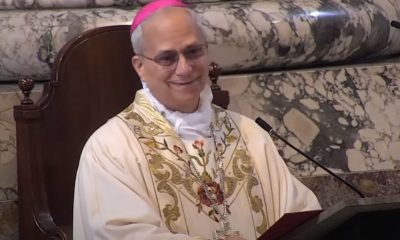
 The Vatican3 days ago
The Vatican3 days agoAmerican cardinal chosen as next pope
-

 a&e features3 days ago
a&e features3 days agoYour guide to the many Pride celebrations in D.C. region
-

 U.S. Supreme Court5 days ago
U.S. Supreme Court5 days agoSupreme Court allows Trump admin to enforce trans military ban
-

 District of Columbia4 days ago
District of Columbia4 days agoWorldPride permits for National Mall have yet to be approved

